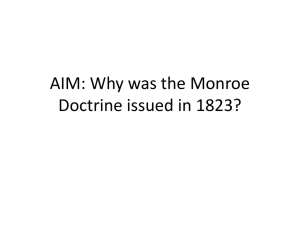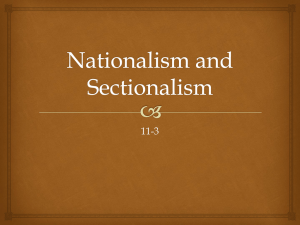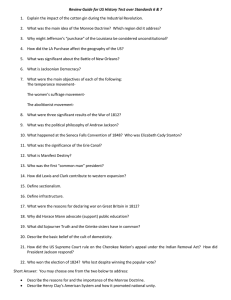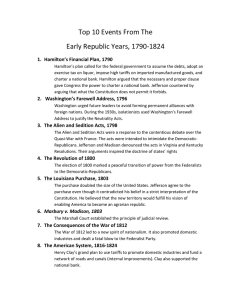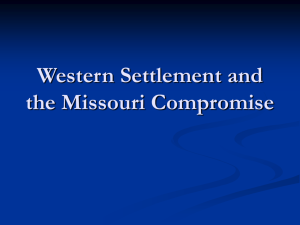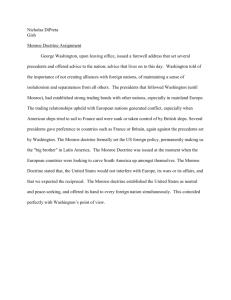The Presidency of James Monroe
advertisement
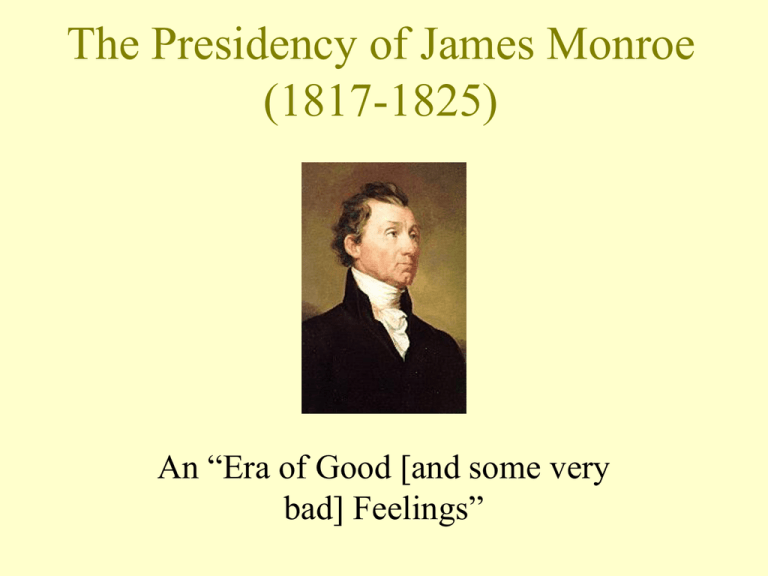
The Presidency of James Monroe (1817-1825) An “Era of Good [and some very bad] Feelings” James Monroe: Who is he? • http://www.youtube.com/watch?v=cwvHtk CusHo RESUME and REPUTATION • Served with Washington at Trenton • Governor of Virginia • Member of Articles of Confederation Congress • Minister to England, France, and Spain • Secretary of State and War • Not an Original or deep thinker • Considered highly honorable and ethical • Last of the Virginia Dynasty and “Knee Britches” Presidents • Teflon President Era of Good Feeling • Era of Good Feelings label comes from a single but important Good Will tour of New England in 1817 • Ran unopposed in 1820 and got all but 4 electoral votes • Great Cabinet: John Quincy Adams, William H. Crawford, John C. Calhoun Adams, Crawford, & Calhoun James Monroe and the “New Nationalism” • Accepted Madison’s Address proposals of a protective tariff and a new national bank which would be known as the 2nd National Bank • The National Bank was to finance the building of road systems and canal systems for the U.S. economy • Opposed Federal Aid to Internal Improvements on Constitutional Grounds The American System • Protective tariffs are taxes that make imported goods very expensive, it is a way of making American goods desirable because they are cheap First Seminole War • Indians and escaped slaves are raiding Southern settlements • General Andrew Jackson is sent to pursue the raiders and captures 2 Spanish forts Seminole War 1817-1818 Panic of 1819 • Falling Cotton Prices • Land Speculation— public domain purchased on credit • Hard Money policies of Langdon Cheves created anti-bank feeling Missouri Compromise • Alabama and Illinois had just been admitted to Union • James Tallmadge of NY proposed that Missouri should alter its constitution to be a free state • Objection to 3/5s clause • Henry Clay “Firebell in the Night”brokered two compromises • Thomas Amendment of 36-30 • Difficulty of slavery as an issue in national politics Henry Clay The Missouri Compromise of 1820 • (1) Missouri was admitted as a slave state and Maine (formerly part of Massachusetts) would be a free state • (2) except for Missouri, slavery was to be excluded from the Louisiana Purchase lands north of latitude 36°30. • Basically this divides the nation in half by saying that slavery is allowed under the 36°30 line. Reasons for the Missouri Compromise of 1820 • Allow Americans to move into the MidWest territories and begin to apply for admittance in the United States • Northern and Southern states begin to argue in Congress about whether or not new states should be slave or free states Missouri Compromise Northern and South Perceptions of the Compromise • Northerners felt that slavery should have been stopped from expanding. • Southerners feared that compromising on the issue of slavery will allow the government to eventually make laws about slavery. Monroe’s Foreign Policy • Improved Relations with Great Britain • Florida Acquisition • Monroe Doctrine Improved Relations with Great Britain • Most assumed that a 3rd British war would ensue • Rush-Bagot Agreement—only revenue cutters on Great Lakes—tradition of unfortified boundary • Convention of 1818—49th parallel between La. Purchase and Canada; joint occupation of Oregon; U. S. could fish Grand Banks • Caribbean remained a challenge Richard Rush’s Note And in further answer to Ms Bagot's note, the Undersigned, by direction of The President, has the honor to state, that this Government, cherishing the same sentiments expressed in the note of the second of August, agrees, that the naval force to be maintained upon the Lakes by the United-States and Great Britain shall, henceforth, be confined to the following vessels on each side,-that is: On Lake Ontario to one vessel not exceeding One Hundred Tons burden, and armed with one eighteen-pound cannon. On the Upper Lakes to two vessels not exceeding the like burden each, and armed with like force, and on the waters of Lake Champlain to one vessel not exceeding like burden and armed with like force. And it agrees, that all other armed vessels on these Lakes shall be forthwith dismantled, and that no other vessels of war shall be there built or armed. And it further agrees, that if either party should hereafter be desirous of annulling this stipulation and should give notice to that effect to the other party, it shall cease to be binding after the expiration of six months from the date of such notice. Florida Acquisition • Spain would not police Florida, which was haven for Maroon Communities and Seminole Activities • Jackson’s Raid—Hanged Arbuthnot and Ambrister • Cabinet Crisis—only John Quincy Adams backed Jackson • Adams-Onis Treaty Andrew Jackson Adams-Onis Treaty • Spain ceded Florida • U. S. assumed claims of its citizens against Spain up to $5 million • U. S. relinquished claims to Texas • Southern boundary of Louisiana Purchase clarified Adams-Onis Boundaries Monroe Doctrine--1823 • Congress of Vienna and Legitimacy • Latin American/Mexican Revolutions • British Interests • “Cockboat in the wake of a British Man of War” • Western Hemisphere is closed to further European Colonization • Attempts to colonize would be viewed unfavorably • No interference with existing colonies • U. S. would stay out of European affairs Monroe Doctrine • In Latin America, it is a period of revolution and liberation. • Chile, Venezuela, Mexico and Brazil have gained their freedom from Spain and Portugal. The United States recognizes them as legitimate countries. • America fears that other foreign countries like France and Britain may now want to control these countries in Latin America. Monroe Doctrine cont…. • Warns European nations that they cannot set up colonies or interfere in Latin American problems anymore. • The United States will protect North and South America from any European influence. • The United States will not involve itself in European affairs militarily or politically. Monroe Doctrine Political Cartoon Meaning of Monroe Doctrine • Wasn’t called Monroe Doctrine until 1852 • Precedent of Hemispheric Supremacy or Control • Precedent of Isolationism with Europe Meaning of Monroe Presidency • Transition from Virginia Dynasty to Tempestuous (turbulent) Politics of 2 Party System • Challenge of slavery issue • Territorial Expansion
